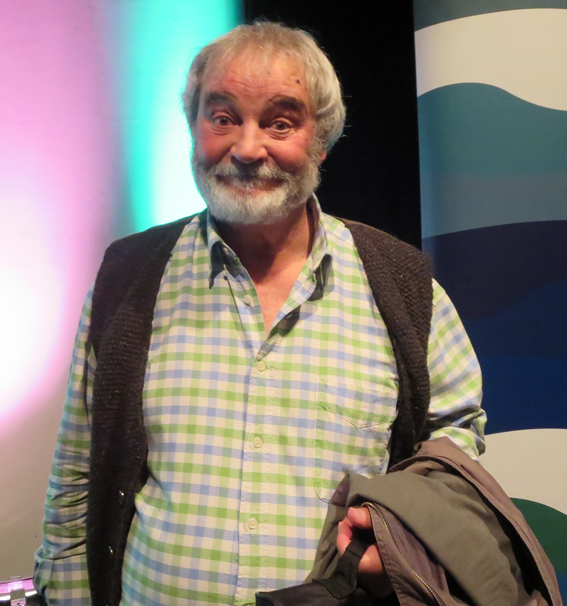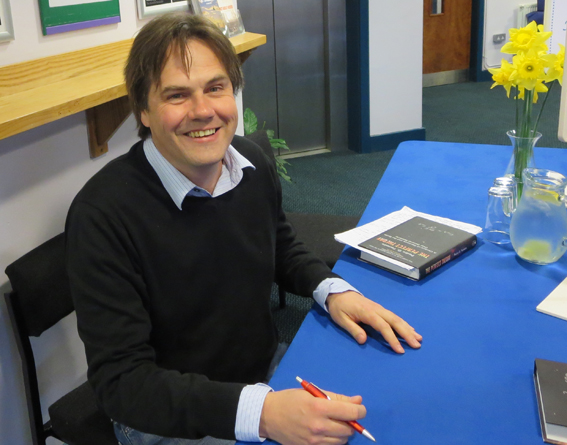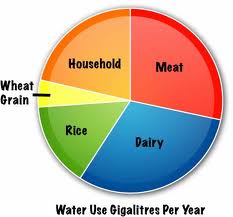After a busy, but relaxing, holiday in the Lake District, attending events at the Words by the Water Festival, I’ve returned to a mountain of urgent work; so this final blog of the festival will of necessity contain slightly less information about the talks and readings than some of the earlier ones.
To continue where I left off last time, on Friday morning Claire Langhamer (pictured left with Paul Brassley) talked about The English in Love, quoting such diverse sources as Agony Aunts and the Mass Observation Archive of 1937.
I then moved on to a session on George Eliot’s Middlemarch.  When I was booking tickets, I was somewhat surprised that this event was the one that nearly sold out on the first day. Rebecca Mead, who is now a journalist on the New York Times, was interviewed before a capacity audience in the Studio. She outlined how her early life followed, to some extent, a similar pattern to that of George Eliot’s, as she escaped a small rural community (in Rebecca’s case by going up to Oxford). Middlemarch was initially serialised, and Mead shared an amusing anecdote about a bishop at the time being discovered at a conference reading the latest instalment of Middlemarch which was tucked into the hat on his lap.
When I was booking tickets, I was somewhat surprised that this event was the one that nearly sold out on the first day. Rebecca Mead, who is now a journalist on the New York Times, was interviewed before a capacity audience in the Studio. She outlined how her early life followed, to some extent, a similar pattern to that of George Eliot’s, as she escaped a small rural community (in Rebecca’s case by going up to Oxford). Middlemarch was initially serialised, and Mead shared an amusing anecdote about a bishop at the time being discovered at a conference reading the latest instalment of Middlemarch which was tucked into the hat on his lap.
 We had received news by this time that Melissa Benn was unable to share the session on ‘Ages of Feminism’ with Lynne Segal because her father was very ill. We were therefore not over-surprised, though we were extremely sad, to hear that morning that Tony Benn had died. Lynne Segal was up to the challenge of filling the allotted hour, and she spoke movingly about the disappointment of observing the state of our country and politics now, after both Socialism and Feminism had fought so hard for something better.
We had received news by this time that Melissa Benn was unable to share the session on ‘Ages of Feminism’ with Lynne Segal because her father was very ill. We were therefore not over-surprised, though we were extremely sad, to hear that morning that Tony Benn had died. Lynne Segal was up to the challenge of filling the allotted hour, and she spoke movingly about the disappointment of observing the state of our country and politics now, after both Socialism and Feminism had fought so hard for something better.

I had not heard the comedian, Jeremy Hardy, before, and enjoyed his event, ‘Not Raving but Frowning’, that evening. I reserve the right to suggest that the ‘f’ word was used rather too frequently and often unnecessarily; but the act was very good and Hardy came across as a delightful, sensitive, politically acute and very funny person.
The subject of Linda Colley’s talk, ‘United Kingdoms’, has a special interest in this year when  part of our United Kingdom is at risk of secession. Colley guided us back through some of the landmarks of our various unions: 1536 – between England and Wales, 1603 – James VI of Scotland becoming James I of England, 1707 – Parliamentary union, 1800 – GB and Ireland, 1922 – United Kingdom and Northern Ireland. She pointed out that all of these unions took place in periods of war, whereas times of peace tend to produce calls for reorganisation and separatism. She also reflected on the present increasingly obvious North-South Divide; and there was some discussion with the audience about the possibility and value of Regional Assemblies.
part of our United Kingdom is at risk of secession. Colley guided us back through some of the landmarks of our various unions: 1536 – between England and Wales, 1603 – James VI of Scotland becoming James I of England, 1707 – Parliamentary union, 1800 – GB and Ireland, 1922 – United Kingdom and Northern Ireland. She pointed out that all of these unions took place in periods of war, whereas times of peace tend to produce calls for reorganisation and separatism. She also reflected on the present increasingly obvious North-South Divide; and there was some discussion with the audience about the possibility and value of Regional Assemblies.
 On Saturday afternoon, Paul McMahon spoke on the subject of ‘Food Glorious Food’, based on his book Feeding Frenzy in which he addresses the question of whether it is possible to feed the world’s population as it rises to nine billion by the middle of this century. He assured us that there is enough land and enough water to allow sufficient food to be produced. At present one in eight people on the planet is hungry and one in five is obese; there is land degradation, flooding and erosion; the prices of raw commodities are rising, and consequently so are food prices; in the US, 40% of the grain crop is used for biofuel; there is growing competition from the East, and speculation causes problems. McMahon advocated 1) helping small farmers in poor countries, 2) putting ecology at the centre of food production, 3) making financial markets work for food security and 4) learning how to ‘love’ high food prices. I was disappointed that no mention was made of vegetarianism. It has been acknowledged since at least the 1960s that if people would reduce their consumption of meat, there would be easily enough food to go round.
On Saturday afternoon, Paul McMahon spoke on the subject of ‘Food Glorious Food’, based on his book Feeding Frenzy in which he addresses the question of whether it is possible to feed the world’s population as it rises to nine billion by the middle of this century. He assured us that there is enough land and enough water to allow sufficient food to be produced. At present one in eight people on the planet is hungry and one in five is obese; there is land degradation, flooding and erosion; the prices of raw commodities are rising, and consequently so are food prices; in the US, 40% of the grain crop is used for biofuel; there is growing competition from the East, and speculation causes problems. McMahon advocated 1) helping small farmers in poor countries, 2) putting ecology at the centre of food production, 3) making financial markets work for food security and 4) learning how to ‘love’ high food prices. I was disappointed that no mention was made of vegetarianism. It has been acknowledged since at least the 1960s that if people would reduce their consumption of meat, there would be easily enough food to go round.
 I had heard Germaine Greer lecture before and been impressed by her, so went to her talk on ‘The Rainforest Years’. Greer was not as incisive as last time I heard her, but it was interesting to hear a little about her work to restore a sixty hectare area of Queensland in Australia, which she took on as a challenge and as something where she could have an effect. Greer’s love of and knowledge of zoology, and her passion for the environment, are both impressive.
I had heard Germaine Greer lecture before and been impressed by her, so went to her talk on ‘The Rainforest Years’. Greer was not as incisive as last time I heard her, but it was interesting to hear a little about her work to restore a sixty hectare area of Queensland in Australia, which she took on as a challenge and as something where she could have an effect. Greer’s love of and knowledge of zoology, and her passion for the environment, are both impressive.

On Sunday morning Colin Tudge spoke on the subject his latest book, ‘Why genes are not selfish and people are nice’. I’ve done a little work in this area myself, so was keen to hear what Tudge had to say. Tudge has been involved in the Campaign for Real Farming, and urges an enlightened agriculture. He also believes that life in all its forms is intrinsically cooperative, and that therefore cooperativeness is the best survival tactic.
I would like to have stayed in Keswick to hear the talk on ‘Malala’ later on Sunday afternoon, but it was imperative that I got home that night so I had to give that one a miss. The last presentation I was able to attend at the festival, therefore, was given by Pedro Ferreira on ‘Einstein, Relativity and Perfection’.
 It was good to end on a real high. Ferreira, who is a Professor of Astrophysics at Oxford, is another of those wonderfully bright academics who are such a joy to observe and listen to. He was bubbling with excitement about the news that was going to break the next day about Gravitational Waves – predicted by Einstein 100 years ago – and he explained something of the research and discovery to us. In a talk ranging over General Relativity and our modern understanding of gravity, Quantum Mechanics, Dark Matter and little green men, I suppose this highly personable Portuguese scholar was bound to lose me from time to time; but he never made his audience feel stupid, or risk losing our attention.
It was good to end on a real high. Ferreira, who is a Professor of Astrophysics at Oxford, is another of those wonderfully bright academics who are such a joy to observe and listen to. He was bubbling with excitement about the news that was going to break the next day about Gravitational Waves – predicted by Einstein 100 years ago – and he explained something of the research and discovery to us. In a talk ranging over General Relativity and our modern understanding of gravity, Quantum Mechanics, Dark Matter and little green men, I suppose this highly personable Portuguese scholar was bound to lose me from time to time; but he never made his audience feel stupid, or risk losing our attention.
Congratulations to Kay Dunbar and Stephen Bristow on another great festival. We thoroughly enjoyed the events, and also revelled in our wonderful position on the shore of Derwentwater and our daily walks to the theatre. The scenery changed every day: we watched as the snow on the mountains gradually diminished, we observed the lake water encroach on our van in the storm and then return to its proper bounds, we ate outside when the sun shone, saw enough daffodils to keep Wordsworth happy for many a year, and we enjoyed spending time with lots of old and new friends.
3 Comments

 up for changing the world, we read in the New Internationalist that if everyone stopped eating meat there would be enough food to go round the whole world’s population. Looking back,
up for changing the world, we read in the New Internationalist that if everyone stopped eating meat there would be enough food to go round the whole world’s population. Looking back,








